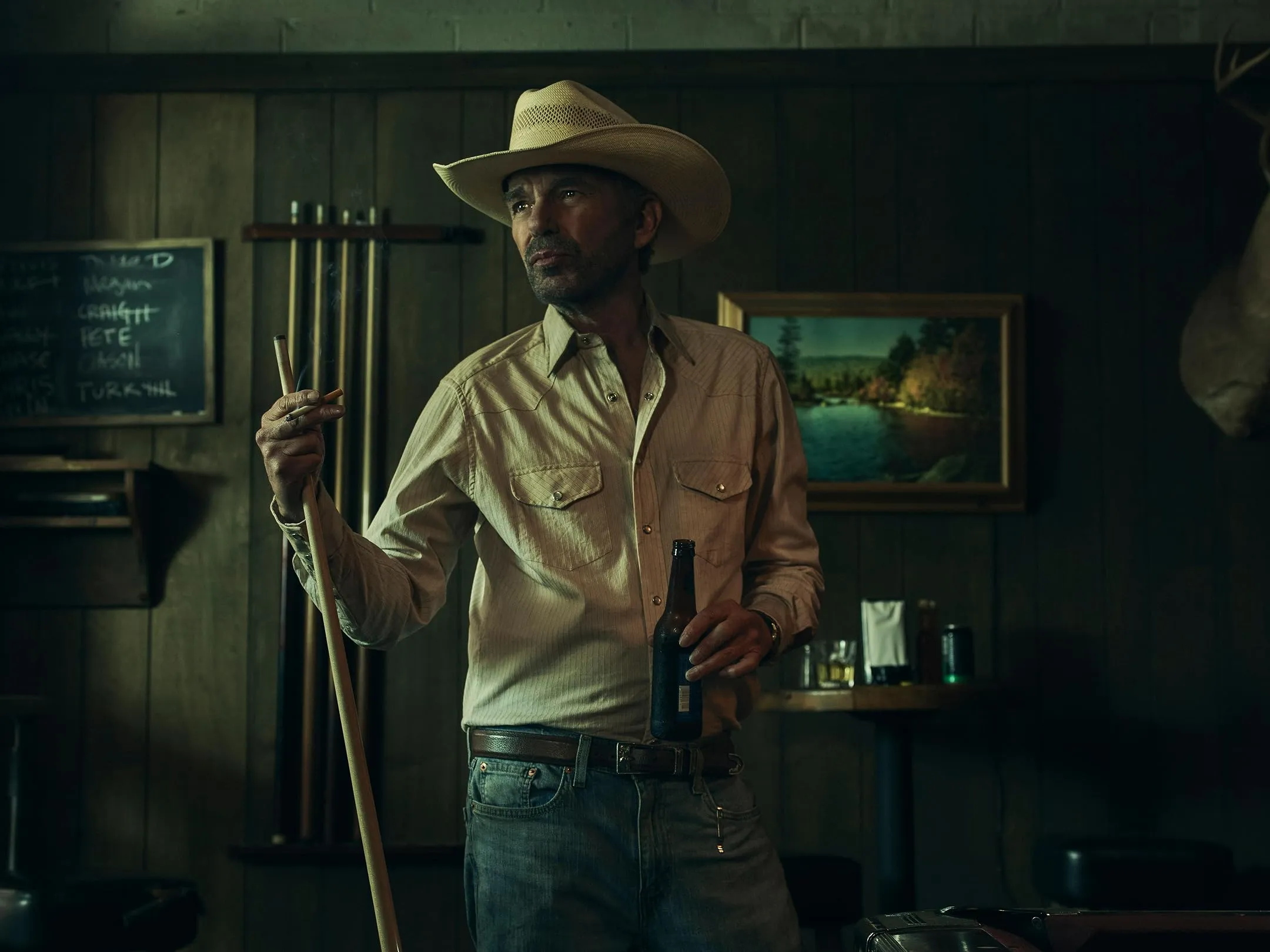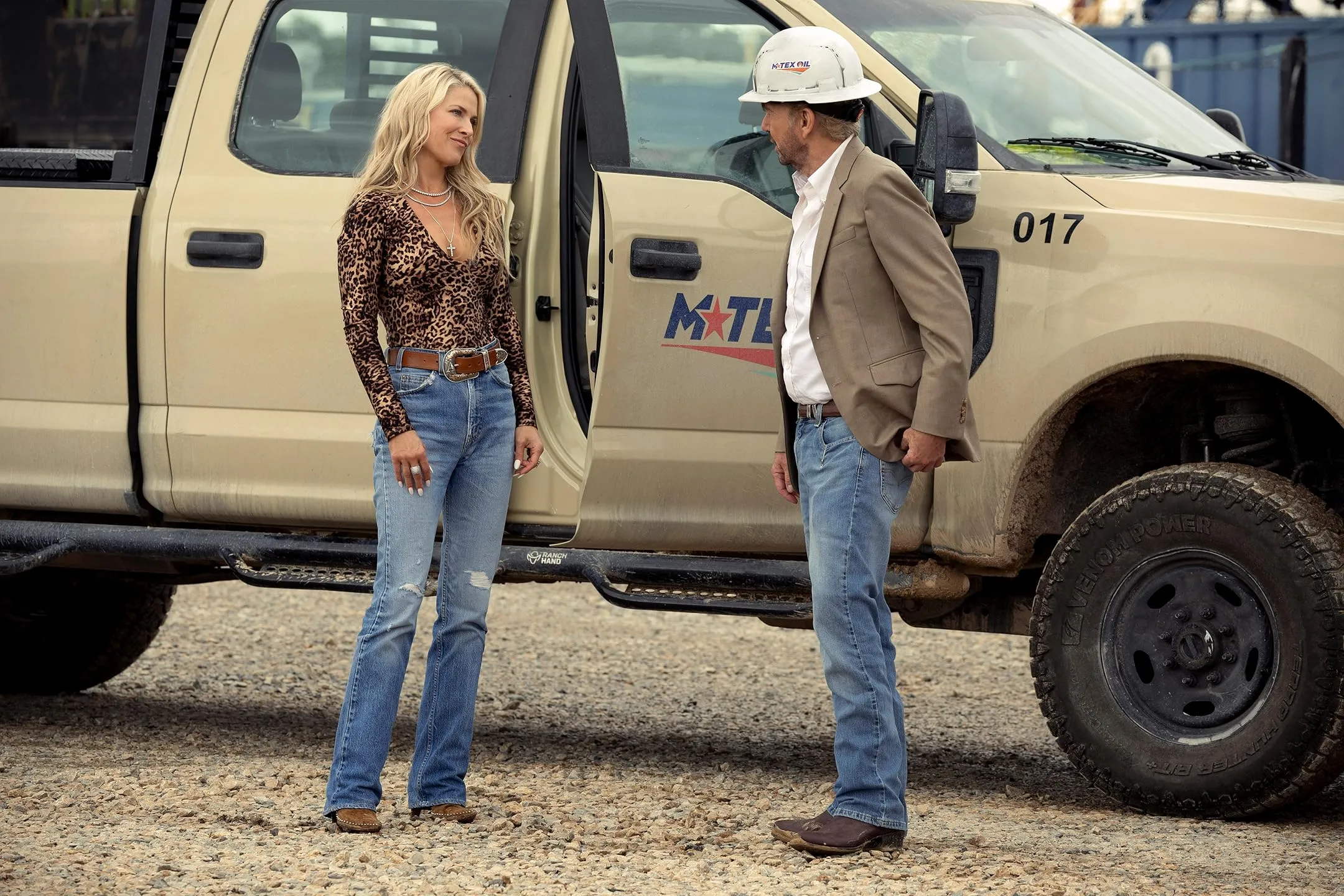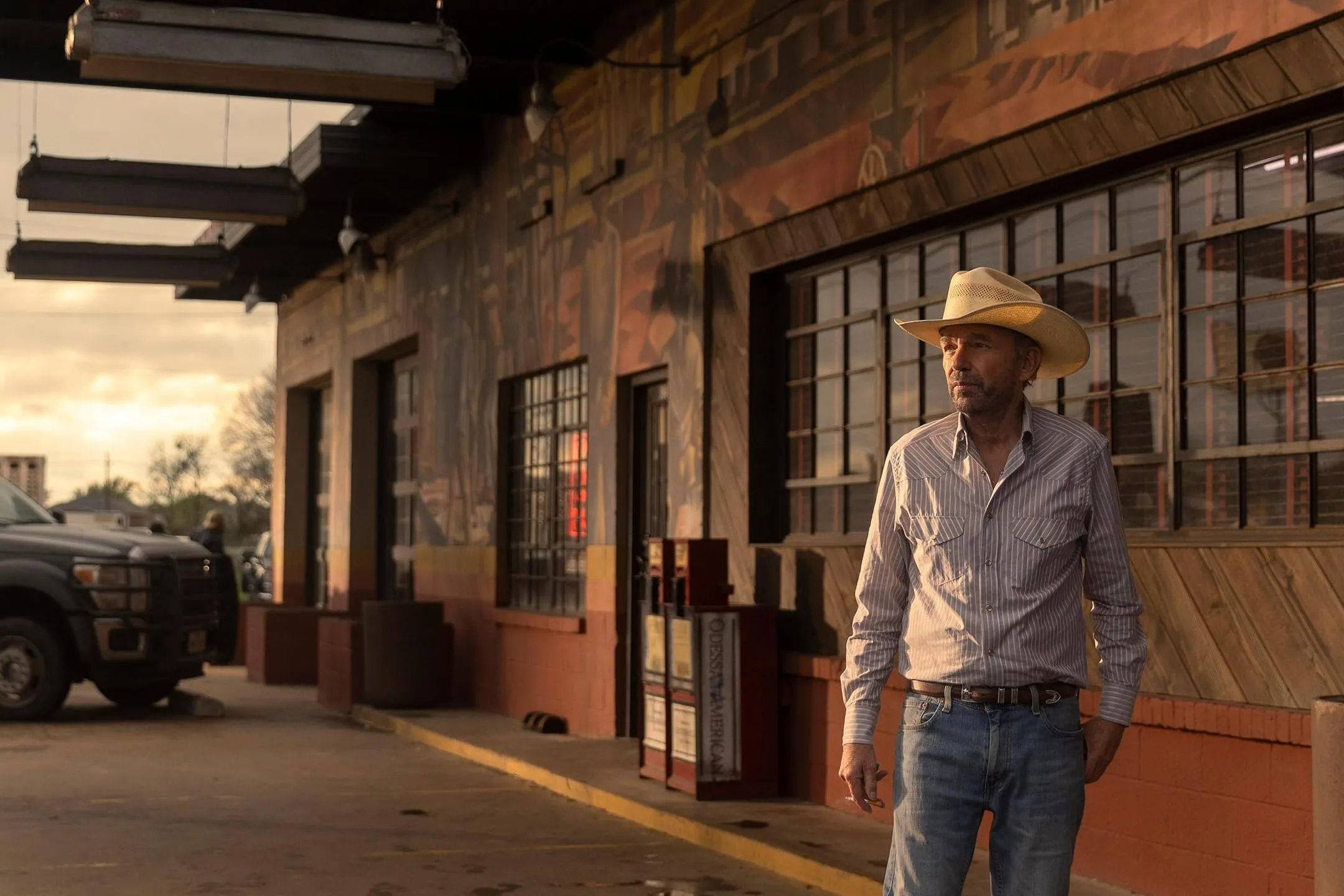Taylor Sheridan continues to amaze TV viewers with “Landman,” a new Paramount+ drama that starts on November 17 and goes deep into the dirty world of Texas’s oil industries. This series is another smart addition to Sheridan’s story empire. It came from a surprising but interesting place: Christian Wallace’s highly acclaimed “Boomtown” podcast.
“Landman” is not a straight adaptation but a fictionalized look into the Permian Basin’s oil boom based on the podcast. Wallace’s original work, nominated for a Webby Award, broke down the complicated oil production environment by talking to workers and big names. Sheridan, known for turning complicated real-life stories into interesting TV shows, saw great potential for dramatic interpretation.
The series is a classic Sheridan production: a modern story with much regional realism. “Landman” continues Sheridan’s signature style of showing societal tensions through localized stories by focusing on the complicated power dynamics in the oil business. The podcast’s documentary-like insights give the dramatic story a documentary-level realism, letting viewers experience a part of modern American industrial culture rarely shown on screen.
Streaming every Sunday, “Landman” looks like it will be more than another oil industry drama. It’s a complicated look at how people survive, power, and the economy in one of America’s toughest industrial landscapes.
Crude Realities: Navigating the Oil Patch’s Treacherous Terrain
Tom Norris isn’t like most heroes. Billy Bob Thornton plays him and is in charge of handling a crude oil disaster. He is very close to destroying everything. The first scene of the show sets the mood: Norris is bound and bagged and could be executed while on a dangerous mission to get a land lease from the leader of a Mexican drug gang. It’s a baptism of fire that shows right away how rough oil business negotiations can be.
The plot of “Landman” is based on a complicated web of corporate greed and human survival. Jon Hamm plays Monty Miller, an oil baron whose business is built on calculated risk and cruel strategy. Norris works for Miller. The story revolves around a terrible accident that serves as a testing ground for more in-depth themes of power, abuse, and making ends meet.
The show doesn’t hide the hard truths about the oil business. Each character shows a different part of this harsh world: the workers struggling and risking their lives, the business giants counting their billions, and the families stuck in the middle. Norris is a great example of this tension because he is strongly rooted in a system he both uses and criticizes.
Personal drama and business mystery are mixed. Norris’s broken family life, which includes a tense relationship with his ex-wife Angela and a tense relationship with their children, reflects broken dreams and economic stress in society as a whole. Cooper, his son, decides to work in the oil fields, which is a powerful example of the few job options in modern America.
The show tries to show how the complex ecosystem of oil production works and how money moves up the chain while danger and hardship hit those at the bottom. The story is full of the raw energy of trying to make ends meet, where every talk is a deal, and every relationship is a transaction.
Roughnecks and Rivalries: Character Dynamics in the Oil Patch
Billy Bob Thornton turns Tommy Norris into a model of complicated manhood. He’s neither a hero nor an antihero; he’s just a survivor living on the edge of the dangerous oil business. Thornton gives Norris a worn-out realism that fits the character, whose whole life is a balancing act between meeting his company’s needs and staying alive on his own. His character has rough, poetic speeches that sound like a mix of half-truths and myths about the American working class.
Jon Hamm’s character, Monty Miller, is the perfect oil baron: well-groomed and always planning. The puppet master is far away, pulling the strings, and Norris is his main tool for control. One person in charge tells the other person what to do, a standard power dynamic.
The show’s most complicated storylines can be seen in how the Norris family interacts with each other. Angela (Ali Larter) and Cooper (Jacob Lofland) are two characters from different generations who struggle with money. Meanwhile, Michelle Randolph’s Ainsley becomes a problematic focal point; she’s more of a plot device than a fully formed character. It’s not clear where the line is between sexualizing her and helping her grow as a person.
Writing that is too simple hurts female characters the most. Kayla Wallace and Paulina Chavez are both very good actors. Still, they are often reduced to stereotypes, like the driven lawyer, the good woman of color, or the manipulative ex-wife. Even Demi Moore’s character doesn’t feel like it has much promise because she doesn’t have much screen time, and her talent isn’t used.
The ensemble cast works like a complicated machine, with each part moving about the others, though not always neatly. People perform seriously even when the material doesn’t fully back how deep they go. Thornton is still the center of attention; his nuanced performance as a man struggling with societal corruption and personal redemption makes every scene better.
What emerges is a picture of how strong people can be in a seemingly inhuman field—where life means always negotiating, and every relationship is a possible deal.
Power, Profit, and Perspective: Unraveling Social Fault Lines
“Landman” isn’t just a story about oil; it’s also a raw look at America’s economy, where staying alive is a high-stakes game already set up. The show brutally shows the gross math behind wealth: billionaires make $3 billion daily, while workers risk everything for small rewards.
The story’s most interesting but underrepresented characters are the Mexicans who work on the oil rigs. They are the backbone of a business that simultaneously depends on them and treats them badly. Their stories show a harsh truth about the economy. These men support their families by working the only jobs that will pay, while when something bad happens, their wives become the main breadwinners.
Underneath the surface, systemic racism beats through minor structural inequality rather than big fights. As a small example of larger forms of injustice in society, the oil industry acts like a machine, taking work from weak communities while pretending to be impartial.
Environmental commentary can be found in quiet times. Characters talk about extracting resources very practically, which shows that economic worries always come before environmental ones. The environment becomes a character; it is used, hurt, and strong simultaneously.
It’s still hard to represent people. Even though the show has many different kinds of characters, it still mostly shows white people’s points of view. The show tries to be intersectional but ultimately falls short because it treats minority experiences like background noise instead of real story depth.
In the end, “Landman” paints a harsh picture of an industry where people’s honor is constantly negotiated, traded, and often thrown away in the name of making money. It’s less of an analysis and more of an honest account of life in today’s capitalist world.
Rusted Horizons: Crafting Visual Poetry in the Oil Patch
“Landman” is another great example of how to tell a story about a place in the South by Taylor Sheridan, known for turning scenery into stories about people. The series has almost documentary-like realism thanks to how he directs it, a mix of a few words spoken and visual metaphors.
The scenery in West Texas isn’t just a background; it’s a character that comes to life. Films show the harsh beauty of the area, with endless views punctuated by industrial machinery and dusty roads cutting through empty land. Each frame looks like a painting that muses on how to survive in a bad economy; people are small compared to the machinery and equipment.
The camera work shows the stress in the story. During negotiation scenes, tight, suffocating shots contrast with wide shots showing the size of the oil areas. The visual language says a lot about power; the characters seem unimportant and important in this complicated environment.
Sheridan’s production design doesn’t try to make things look cool. Interiors of small towns, work trucks, and oil rigs all look worn. Costumes show social rank: roughnecks wear worn-out jeans and steel-toed boots, while corporate types wear fitted suits that look almost fake against the rough background.
The story’s emotional landscape is reflected in the music, which is mostly simple and rhythmic, with some country-inspired tunes that make you feel alone and strong. The music doesn’t use melodrama but has soft emotional themes that show how the character’s emotional lives are kept in check.
What comes together is less of a traditional story and more of a visual poem about survival in today’s economy. It is rough, uncompromising, and has many different layers.
Familiar Territories: Sheridan’s Continuing Narrative Expedition
Taylor Sheridan has become the best TV reporter for American landscapes that don’t get enough attention, and “Landman” is another complex piece in his huge puzzle. Like “Yellowstone” and “Tulsa King,” the series digs into the power structures in certain regional ecosystems, turning local stories into stories about all people.
Sheridan’s stories always have the same basic structure: morally complicated people who have to deal with harsh economic systems where they have to negotiate constantly to stay alive. John Dutton or Sylvester Stallone’s character in “Tulsa King” is spiritually similar to Tommy Norris. Both men are fighting for establishment power while keeping a fragile personal code.
“Landman” is different because it only discusses industrial physics. Instead of focusing on the ranch life of “Yellowstone” or the criminal underworld of the mayor of Kingstown,” this show examines business through the lens of the oil industry. The “Boomtown” podcast is as real as a documentary, which moves Sheridan’s style of telling stories into more journalistic territory.
But common Sheridan traits like conservative main characters, exploring men’s weaknesses, and landscapes that feel like extra characters are still there. His goal with this series is to bring to light America’s lost stories between the news in big cities and the lives of people in the country.
“Landman” doesn’t remake Sheridan’s ideas; instead, it improves them. It’s a calmer, more thoughtful look at power—less explosive and more intellectual. He has a more complex regional tale to add to his growing collection.
Crude Emotions: Navigating the Landscape of Human Survival
It seems like “Landman” is a story walking a tightrope between dark comedy and deep social criticism. The show does more than tell a story; it carefully cuts apart the American economic experience, using comedy as a scalpel and a shield.
The tone is very close to being both silly and sad. Tom Norris’s monologues are a mix of philosophical treatises and sarcastic stand-up acts. Dark humor becomes a way for people to stay alive; they use their wit to protect themselves against a system always trying to crush them. As a metaphor for the mental gymnastics needed to live in the oil patch, a negotiation scene could go from a tense confrontation to a darkly funny one in one breath.
Philosophical depth can be found in seemingly ordinary encounters. When people talk about land leases, they use them as metaphors for bigger problems, like balancing life with respect. The show makes the point that in the harsh world of capitalism, everyone is both a hunter and a prey.
Emotionally, “Landman” doesn’t go for easy nostalgia. The characters aren’t trying to be forgiven; they’re just trying to stay alive. Every relationship seems like a complicated business deal, where mental assets are exchanged with the same level of care as oil rights. People who watch the show are asked to think beyond traditional storylines because it shows human relationships as complex, transactional ecosystems.
“Landman” is a rare treat for drama fans who want more than just the bare minimum. While it’s not pleasant to watch, it’s also very honest. They will be captivated by stories with many layers and characters that don’t try to teach a lesson.
Ultimately, the show works as a mirror, showing the complicated and sometimes unpleasant facts of modern American economic life. It doesn’t judge; it just sheds light, leaving people to think about what it all means.
People who like complex stories, socially conscious stories, and viewers ready to face uncomfortable facts about economic survival should watch this.
The Review
Landman
"Landman" goes beyond standard storytelling by being a raw, uncompromising look at how to make a living. Taylor Sheridan keeps showing how he can turn stories from different parts of the country into common human experiences. Even though the show sometimes has problems with character growth and representation, it is still a fascinating look at power, survival, and the harsh workings of capitalism. The show is held together by Billy Bob Thornton's nuanced performance, which turns what could have been a simple business drama into a deep reflection on modern American life. The show navigates the complicated themes of wealth inequality, systemic oppression, and personal strength, giving viewers a difficult and deeply engaging experience. Even though it has some problems, like characters that aren't used enough and parts of the story that don't make sense, "Landman" is a great addition to Sheridan's already amazing body of work.
PROS
- Exceptional lead performance by Billy Bob Thornton
- Authentic portrayal of oil industry dynamics
- Visually stunning cinematography
- Nuanced exploration of socioeconomic issues
- Taylor Sheridan's distinctive storytelling approach
- Compelling narrative about economic survival
CONS
- Uneven character development
- Stereotypical representation of female characters
- Occasional narrative inconsistencies
- Limited depth in exploring racial themes





















































